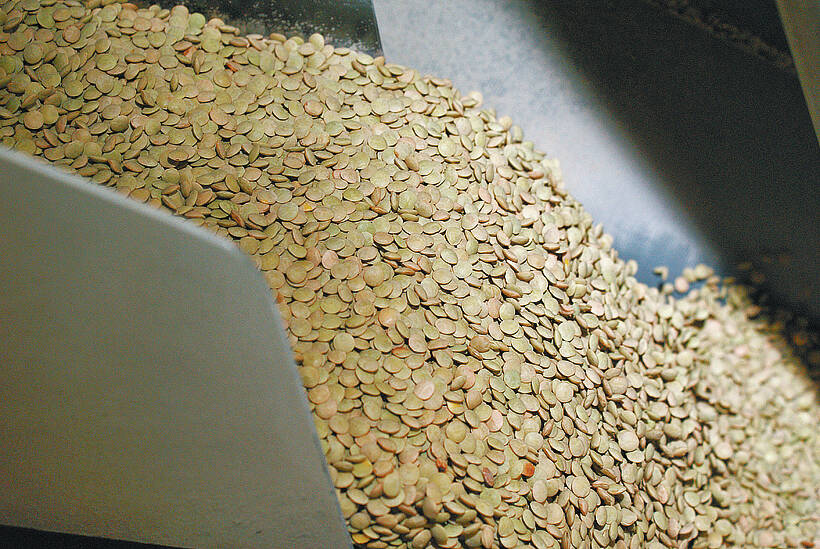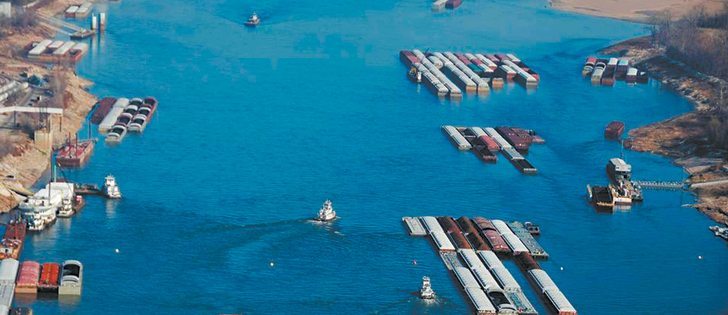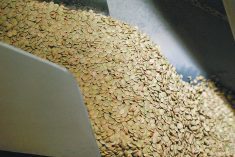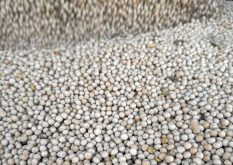Grain, fertilizer exports hindered | Shipping disruptions are affecting commodity markets
Grain prices are falling and will drop further if the U.S. government doesn’t move quickly to boost water levels in the Mississippi River, say concerned agricultural commodity shippers.
They claim a 320 kilometre stretch of America’s most important transportation artery between St. Louis, Missouri, and Cairo, Illinois, will be shut down as early as Dec. 24 if nothing is done to rectify the problem caused by a severe summer drought in the United States.
“That would impede the southbound movement of grains and oilseeds,” said Randy Gordon, president of the National Grain and Feed Association.
Read Also

Green lentil market oversupplied
Farmers in Western Canada can expect price pressure on their new crop of green lentils, as the available supplies among the world’s major lentil-growing nations increase significantly.
“There just wouldn’t be an ability to move them south of St. Louis other than by rail and truck, which are both pretty inefficient.”
While little if any Canadian grain moves on the Mississippi, prices here could be affected because of the critical role the river plays in transportation in the world’s leading grain exporter.
About 60 percent of the United States’ corn and soybean exports travel south by barge on the Mississippi to New Orleans, where they are then shipped around the world. Most of that product would normally find its way down the river system during the next few months.
The river is also used to bring fertilizer north from New Orleans into the northern U.S. Plains and Western Canada.
The volume of fertilizer that typically moves on the river system in January and February can account for 30 to 60 percent of the fertilizer used in the northern U.S., so those prices could be rising, said Gordon.
The National Grain and Feed Association and 20 other agricultural and waterway organizations have sent a letter to U.S. president Barack Obama requesting him to direct the U.S. Army Corps of Engineers to release enough water from the Missouri River reservoirs to maintain a nine-foot navigation channel on the Mississippi River.
They say about 300 million bushels of grain and oilseeds worth $2.3 billion will be delayed getting to market in December and January if nothing is done.
“Reduced supplies in export positions would pressure farm prices and erode the United States’ ability and reputation as a reliable supplier of agricultural products to serve foreign buyers,” the groups said in the letter.
The American Waterways Operators called the situation an “economic disaster.”
“U.S. agricultural export projections are already plummeting as the anticipated absence of cost-effective barge transportation prices American corn and soybeans out of the international market,” AWO president Tom Allegretti said in a news release.
Reuters reports that assistant army secretary Jo-Ellen Darcy, who is in charge of the Army Corps of Engineers, said the Missouri reservoirs are already 20 percent lower than desired and that the requested release of water wouldn’t be enough to maintain navigation on the Mississippi.
Darcy said the combination of dredging and forecasted rain will keep barges moving on the river through mid- to late-December.
However, commodity shippers are already cancelling sales, rerouting cargo and light-loading or pulling barges in an effort to deal with reduced water levels and in anticipation of the closure of a portion of the river.
“Exports are being curtailed. Contracts are being cancelled,” said Debra Colbert, senior vice-president of Waterways Council Inc., which represents shippers, carriers and ports.
Switching to truck and rail is a costly proposition, and these alternatives cannot handle the volume that moves on the river. A dry bulk barge can haul 1,750 tonnes of grain, oilseeds or fertilizer compared to 110 tonnes in a bulk rail car and 25 tonnes in a truck trailer.
“The waterways really provide the most economical, cost competitive way to move agricultural products,” said Colbert.
The shipping disruptions are already affecting commodity markets, said Jamie Wilton, senior commodity futures specialist with ScotiaMcLeod in Winnipeg.
“It’s bearish futures. It’s almost a form of rationing demand,” he said.
Rising freight costs are inflating basis levels, which is reducing futures prices, particularly for corn and wheat, although Wilton thinks it’s only a matter of time before soybeans feel the impact.
“It has been limiting some of the gains here recently and maybe even caused some of the sell-off today here again,” he said Dec. 7.
“I think it will probably get worse.”
Wilton said the higher cost of getting U.S. commodities to market could make Canadian grain and oilseeds more competitive.
“It may push some extra demand towards canola or Canadian milling wheat,” he said.
The river problems could push more U.S. grain to the West Coast, but there are problems there, too, in the form of labour contract disputes at ports in the Pacific Northwest.
Gordon said longshoremen in Portland are involved in labour negotiations that aren’t going well. The dispute could affect six grain terminals in Portland, Vancouver and Puget Sound if it escalates into a full-fledged work stoppage.
He said the Mississippi River issue has escalated to “a pretty high level” in the White House, but there is plenty of opposition to the request to open the taps on the Missouri River reservoirs.
Members of Congress from the northern Plains say water from the Missouri River is used for industry, irrigation and wildlife in their states.
The U.S. Army Corps of Engineers typically starts gradually restricting flows from the Missouri during the winter starting in November and then shuts the taps off in December.
“Essentially, what we’re talking about is that water levels could drop a foot a week for at least the next couple of weeks,” said Colbert.
She said keeping the Missouri River reservoirs open would deplete them by only two or three percent, which would be paid back in the spring through reduced flows if they haven’t been replenished by rainfall. The Corps said it would be more like a five percent reduction in the already low reserves.
“The Corps has absolutely dug in its heels and said that it will not release water,” said Colbert.
The original estimate was that the stretch of the Mississippi between St. Louis and Cairo would become unnavigable by Dec. 10. The new estimate is Dec. 24, although the latest data shows it could be as late as Dec. 28.
















